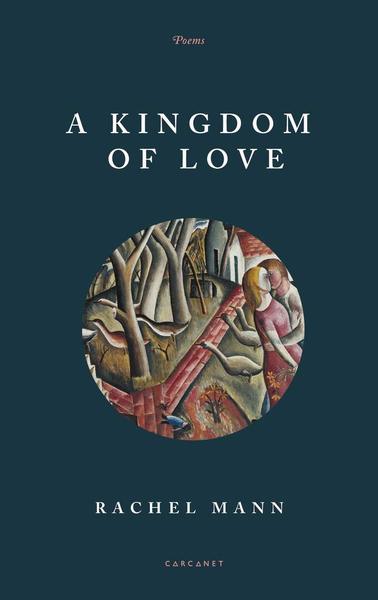
Accept my body as transgression,
My lungs for greed, guts for sloth,
My bones for pride, and envy: my loins.
Receive my tongue with all its
Honeyed compromise; there will be tears.
My skin: confessional, a slate cleaned.
This first collection from priest and writer Rachel Mann is filled with rich imagery and visceral language of the body. The poems are rooted in the framework of Christianity but this is definitely not a book only for Christian readers, or even only those who identify with a religion. Mann writes of love, of connection, of faith and spirit, of death, and of service, topics that any reader might relate to.
The first section is named for, and includes, the title sequence, ‘A Kingdom of Love.’ In my head (influenced by an Anglican upbringing), and I’m sure in many others’, the words ‘Love’ and ‘God’ are almost interchangeable, and particularly so in this phrase. God is Love, and the Kingdom of Love is the Kingdom of God, but word choice is important, and it is love that is foregrounded in this collection. In the second poem of the collection, ‘Collect for Purity’:
Love should taste of something,
The sea, I think, brined and unsteady,
Of scale and deep and all we crawled out from.
If love has a taste then we find out what it is a couple of poems later: in ‘Ubi Caritas’ (the title refers to a hymn for the blessing of the sacrament) love is the way we learn the world: through ‘drool and sweet milk / Through lips.’ Lips that are for suckling, for prayer, for tasting the sacrament, for kisses, and for whispering love. All these images are bound together in a stunning poem only five lines long. In the second poem of the title sequence the speaker asks ‘What then of prayer?’ and then later, ‘What matter if there is no god to validate?’ The speaker reflects on the act of praying and following set liturgy, a ‘formula’ in which ‘words lock into place’. The question is never answered, instead we return to Love as always being a sufficient reference point.
Poetry dealing with religion and spirituality can be in danger of being too ethereal, too ungrounded, but that is never the case here. Mann continually returns us to the body and the concrete world. In ‘The Apocalypse of John’ the mourners gather, ‘Ten of us, eyes downcast,’ and the mood feels lofty, but then in the next line: ‘Behold! A universe in pavement cracks;’ and we are brought back suddenly and unequivocally to the everyday world. These mourners are real people, in a normal environment with its particular imperfections. The poem is far stronger for it. Elsewhere, again, death and the body are brought together:
Move closer. Breathe my dust, my very flesh
settling. Be dust with me.
[…]
Isn’t this how it should be? Piling
fold on fold, letting gravity pull
on our bones, till we can resist no more?
Mann reminds us that we are solid, breathing beings, and that when considering the great abstract ideas of love and death we cannot remove ourselves from the tangible details.
Many of the poems in the collection are spoken from the point of view of the parish priest, who is and also is not Mann herself. Often, the tone is reflective, considering the small routines of the priest’s day and week, and always again with Mann’s signature closeness of attention to detail and concreteness. She moves effortlessly from the broad to the particular: ‘East of Eden, East of Salford, benched / With drunks. Beyond the wall, buses squeal.’ and we never lose sight of the fact that there is a person behind the voice of the poems: ‘Night, and my offering is due, / I have electronics, tough screens, apps, / My stall is cold, a candle casts white flush // Of death across my hands.’
There is no didacticism or moralising in this collection, there are more questions raised than answered. These are poems to sit with, to linger over; thoughts to reflect on which perhaps return a different reaction on another visit. It is beyond question that we are living in a difficult time right now. Strong forces work deliberately to incite conflict and divide us, and I believe that we are more in need of love than ever. For me, that love is related to spirituality and God, but it needn’t be – love is sufficient on its own. This book has a great deal to offer those who don’t believe in a god; strength, connection, the time taken to slow down and reflect on how we relate to others, and how we can continue to move forward on both difficult days and joyous ones. From the penultimate poem, Mattins:
Beyond windows, a chorus,
Bright alto, a thousand hidden lungs
And throats – furious love;
Dawn at the Abbey
And I am wide awake.
Perhaps you believe that the morning’s birdsong is a sign of God, or of a universal Love, or merely of birds doing their thing, saying their authorised words. It doesn’t matter as long as you are awake to it.
A Kingdom of Love is published by Carcanet (2019), with thanks to the publishers for sending me the review copy.